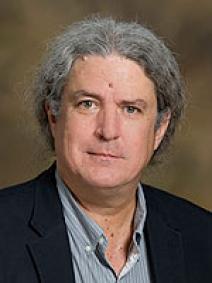Bram Presser: The Book of Dirt (a novel)
January 8, 2019 by David
Filed under Fiction, WritersCast
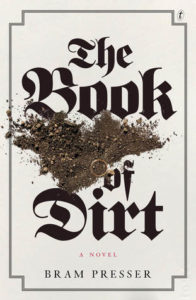 The Book of Dirt – Bram Presser – Text Publishing Company (Australia) – Paperback – 9781925240269 – 325 pages – $15.95 – September 11, 2018 – ebook versions available at lower prices
The Book of Dirt – Bram Presser – Text Publishing Company (Australia) – Paperback – 9781925240269 – 325 pages – $15.95 – September 11, 2018 – ebook versions available at lower prices
Personal and family history for most contemporary Jews is frequently fraught. Most of us have relatives who disappeared without a trace, except for scattered entries in German records of extermination. Some fewer of us have had living relatives whose lives were entwined with and defined by the Holocaust, almost always in horrific and devastating ways.
Bram Presser, an Australian punk rocker and practicing attorney who also happens to be a brilliant writer, spent eight years working on this novel, The Book of Dirt. It is a fabulous story that explores the real life story of Presser’s grandfather, Jakub Rand, from the 1920s onward through the Holocaust and beyond. Presser addresses history in all its complexity with the only tool that could possibly make sense of it – imagination.
Presser starts with family stories and personal legends, combined with archival research and interviews to create this novel. Of course it becomes partly fact, partly fiction. Some is memory and much is imagined.
The relatively large number of characters and the movement between places can be confusing for the reader, but Bram Presser’s grandfather, Jakub Rand, and his grandmother, Dasa Roubicek, and their immediate family are the focus of the book, and their story of survival shines through. The pain and suffering was immense and the power of humanity was as well.
You do not need to be Jewish to find this novel compelling and real. All of us can share through this novel what it means to find hope, and for the descendants of survivors of terror and loss to try to understand the stories of their forebears. This is a wonderful and transformative literary work.
The Book of Dirt has won a number of well-deserved awards in Australia. Bram Presser was born in Melbourne in 1976. He has been a punk rocker, an academic and a criminal attorney. He writes the blog Bait For Bookworms and is a founding member of Melbourne Jewish Book Week. His stories have appeared in Vice Magazine, The Sleepers Almanac, Best Australian Stories, Award Winning Australian Writing and Higher Arc. In 2011, Bram won The Age Short Story Award. Presser’s own website is very active and includes a great deal of material related to the stories behind The Book of Dirt; it is worthwhile to explore.
‘Meet Bram Presser, aged five, smoking a cigarette with his grandmother in Prague. Meet Jakub Rand, one of the Jews chosen to assemble the Nazi’s Museum of the Extinct Race. Such details, like lightning flashes, illuminate this audacious work about the author’s search for the grandfather he loved but hardly knew. Working in the wake of writers like Modiano and Safran Foer, Presser brilliantly shows how fresh facts can derail old truths, how fiction can amplify memory. A smart and tender meditation on who we become when we attempt to survive survival.’
Mireille Juchau
I hope you enjoy listening to Bram Presser talk about The Book of Dirt, a book I strongly recommend you seek out and read.
Podcast: Play in new window | Download
Publishing Talks: David Wilk interviews Dan Blank of We Grow Media
December 16, 2018 by David
Filed under Ebooks and Digital Publishing, PublishingTalks, The Future
 Publishing Talks began as a series of conversations with book industry professionals and folks active in media and technology, at that time, mostly talking about the future of publishing, books and culture. At the outset of this series, I was mostly interested in exploring what people were thinking about the changing economics and culture of publishing and reading.
Publishing Talks began as a series of conversations with book industry professionals and folks active in media and technology, at that time, mostly talking about the future of publishing, books and culture. At the outset of this series, I was mostly interested in exploring what people were thinking about the changing economics and culture of publishing and reading.
Now, I’ve expanded these talks to go beyond the future of publishing – in some cases, by going backwards to discuss the recent history of publishing, and in some instances, sideways into various other realms that interest me. I’ve talked with editors and publishers who have been innovators and leaders in independent publishing in the past, and into the present, and will continue to explore the ebb and flow of writing, books, and publishing in to document the cultural milieu around books, authors and publishers.
Dan Blank is an inspiring and practical thinker about books, authors and readers. We met a number of years ago, and in working with him on a project to help self publishing authors, I was impressed with his thinking and ideas for ways to help writers conceptualize marketing. I first talked to him for Publishing Talks all the way back in 2012 – you can listen to that interview here. I have continued to follow his work through his excellent email newsletter, and frequently, have been inspired by his writing, especially his view of how writers can thrive in a challenging environment. Since so much has changed in the publishing landscape over the past several years, I thought it would be valuable to talk to Dan again about his current work with writers, books, readers, and the way they are connected.
Dan did not disappoint. This interview is full of great advice for writers and anyone who is interested in connecting with audiences in today’s media-rich environment.
As Dan says about himself on his website, he “help(s) writers and creative professionals share their stories and connect with their audience.” He’s worked with hundreds of authors and many publishers as well. And he has written his own book too, making the process of writing and publishing the book part of his experience-based coaching – Be the Gateway: A Practical Guide to Sharing Your Work and Engaging an Audience.
Dan’s website, wegrowmedia.com is well worth spending some time with, and his newsletter has been a valuable source of ideas and inspiration to many.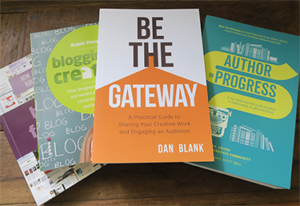
Podcast: Play in new window | Download
Ken Krimstein: The Three Escapes of Hannah Arendt
November 28, 2018 by David
Filed under Graphic Novels, Non-Fiction, WritersCast
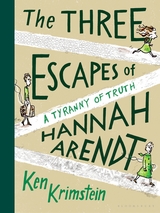 The Three Escapes of Hannah Arendt: A Tyranny of Truth – Ken Krimstein – Bloomsbury – 240 pages – Hardcover – 9781635571882 – $28.00 – September 25, 2018 – ebook versions also available at lower prices.
The Three Escapes of Hannah Arendt: A Tyranny of Truth – Ken Krimstein – Bloomsbury – 240 pages – Hardcover – 9781635571882 – $28.00 – September 25, 2018 – ebook versions also available at lower prices.
What a completely cool and unexpected pleasure it was to discover this amazing book! Yes, I had seen Ken Krimstein’s cartoons in the New Yorker, and I have even read a bit of Hannah Arendt’s powerful writing over the years, but neither Ken’s humorous work, nor my limited knowledge of Arendt’s life prepared me for the serial delight of this graphic novel biography of one of the twentieth century’s most important thinkers.
Hannah Arendt is one of those intellectual figures whose reputation obscures her actual story. Her books were highly influential and widely read in the mid and late twentieth century, though I suspect in present times, now are consumed mostly by college students and scholars, as serious political philosophy does not have a broad readership anymore (if it ever did). We know of her mainly through her many famous books, including The Human Condition, On Totalitarianism, and Eichmann in Jerusalem, among her many, many others.
Arendt’s writing on the nature and form of authoritarianism, couched in her direct experience with Hitler’s Germany, and the rise of Stalin after the war, certainly has become increasingly resonant today, for obvious reasons. And with the increase in modern day anti-Semitism, it is difficult to not draw comparisons between the 1930s world she inhabited and our current troubled experiences.
So it is timely to think about Hannah Arendt’s work, and especially to learn how that work was shaped by her extraordinary life and mind. As revealed in this wonderful biography, Hannah Arendt’s story is heroic and rich. The details about her life continually surprise and delight us. The men and women she knew are some of the greatest thinkers and artists of the century, and it is remarkable just how many now-famous people appear in her life. She knew and associated with so many,from philosophers like Heidegger and Jaspers, to political theorists like Walter Benjamin, writers like Mary McCarthy and geniuses like Albert Einstein and Sigmund Freud, and her own writing and thinking have influenced generations of thinkers and writers.
The escapes Krimstein documents so heart wrenchingly in this book were all determinative to the development of her thinking and writing, and shaped her individualistic, powerful thinking about what it means to be an engaged citizen in a modern world in constant strife. Reading this book was inspiring, and I give full credit to Ken Krimstein for bringing Hannah Arendt to life for me in a way I doubt a prose biography could have done.
Ken Krimstein’s cartoons have been published in the New Yorker, Barron’s, The Harvard Business Review, Prospect Magazine, Punch, The National Lampoon, the Wall Street Journal, Narrative Magazine and many others magazines. His writing has been published in The New York Observer’s “New Yorker’s Diary” and a number of humor websites, including McSweeney’s Internet Tendency, Yankee Pot Roast, and Mr. Beller’s Neighborhood.
Ken is also a teacher at De Paul University and The School of the Art Institute of Chicago. You can read more about him, his work, and The Three Escapes at his website here, where you can also see sample pages from the book.
It was a pleasure for me to meet Ken, and I think you will enjoy our conversation just as much as I did.
“Ken Krimstein’s deeply moving graphic memoir about the life and thoughts of philosopher Hannah Arendt is not only about Hannah Arendt. It’s also, through her words, about how to live in the world, the meaning of freedom, the perils of totalitarianism, and our power as human beings to think about things and not just act blindly. Krimstein explains Arendt’s ideas with clarity, wit, and enormous erudition, and they still resonate.” – Roz Chast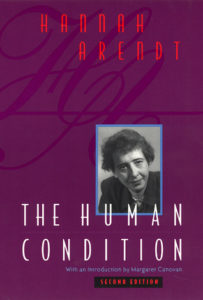
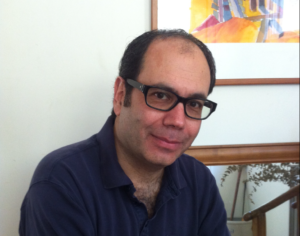
Podcast: Play in new window | Download
Ben Goldfarb: Eager: The Surprising, Secret Life of Beavers, and Why They Matter
November 6, 2018 by David
Filed under Non-Fiction, WritersCast
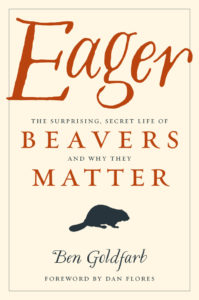 Eager: The Surprising, Secret Life of Beavers, and Why They Matter – Ben Goldfarb – Chelsea Green – 304 pages – Hardcover – 9781603587396 – $24.95 – July 5, 2018 – ebook editions available at lower prices
Eager: The Surprising, Secret Life of Beavers, and Why They Matter – Ben Goldfarb – Chelsea Green – 304 pages – Hardcover – 9781603587396 – $24.95 – July 5, 2018 – ebook editions available at lower prices
This amazing book completely captivated me from beginning to end. Environmental journalist Ben Goldfarb, a Yale Forestry School graduate, is a natural storyteller, and writes with a warm and inviting style. In Eager, he demonstrates how the actions of a single mammal species so thoroughly affects the ecology of rivers and landscapes we have come to take for granted, without understanding the effects of these amazing and inventive rodent environmental engineers.
Beavers have had wide-ranging effects on the landscape for aeons. When Europeans arrived in North America, beavers were everywhere, and the very nature of rivers was completely different than they appear to us today. Slowed in flow, and wildly marshy, because of all the beaver dam building, rivers were rich and varied environments for many species of wildlife, insects and plants.
And yes, beavers are rodents – but very special and important to us all. They were trapped and hunted for their fur in the 18th and 19th centuries. That demand created a hunting and trapping economy that caused beavers to be virtually obliterated from most parts of the United States. And their disappearance literally changed our landscape, allowing the open flow of rivers, thereby causing erosion and the loss of healthy habitat over many years. The river landscapes most of us have seen in our lifetimes simply did not exist 400 years ago.
Beavers have not been appreciated, much less loved, by farmers and ranchers in North America, and typically not understood or appreciated by most of us. But now, in a time of climate change, increasing heat, more drought, and lacking the money or will to build yet more infrastructure, beavers may represent a viable alternative to restoring the health of many river systems around the country.
Ben Goldfarb’s wide ranging and witty book teaches us a great deal about beavers, personalizes their appeal, and shows us why so many people are enthusiastic about beavers now, yet he also shows how difficult it is to change the way we think about beavers and what they can do to make our world a better place. I hope this book adds more than a few beaver enthusiasts to the world, and helps change the way we co-exist with beavers in the future.
It’s impossible to read this book and not come away with a changed perspective. And I really enjoyed speaking with Ben about the book and about his experiences with beavers around the world. Overall, this book is great fun, and I am happy to recommend Eager to readers of all interests.
“Eager takes us inside the amazing world of nature’s premier construction engineer…and shows us why the restoration of an animal almost driven to extinction is producing wide-ranging, positive effects on our landscapes, ecology, and even our economy.”―National Geographic
“This witty, engrossing book will be a classic from the day it is published.” –Bill McKibben, author of The End of Nature
Ben Goldfarb is an environmental journalist and also a writer of fiction. His writing has been published in Science, Mother Jones, The Guardian, High Country News, Audubon Magazine, Modern Farmer, Orion, Scientific American, and many other magazines and journals. He has a masters degree from the Yale School of Forestry and Environmental Studies, and was a 2018 North American Congress for Conservation Biology journalist fellow. You can learn more about his work at his website here.
If you are interested in learning more about beavers or becoming a beaver supporter, there are many organizations around the country. The Beaver Institute is a good one to start with.
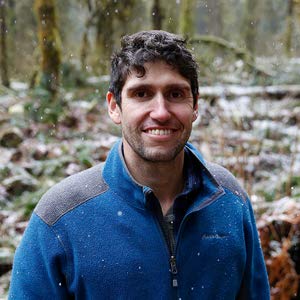
Podcast: Play in new window | Download
Justin A. Frank MD: Trump on the Couch: Inside the Mind of the President
October 23, 2018 by David
Filed under Non-Fiction, WritersCast
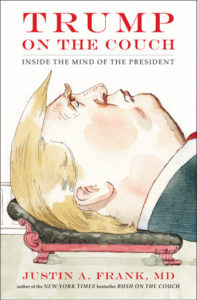 Trump on the Couch: Inside the Mind of the President – Justin A. Frank, MD – Avery – 304 pages – Hardcover – 9780735220324 – $26.00 – September 25, 2018 – ebook editions available at lower cost.
Trump on the Couch: Inside the Mind of the President – Justin A. Frank, MD – Avery – 304 pages – Hardcover – 9780735220324 – $26.00 – September 25, 2018 – ebook editions available at lower cost.
Inside the mind of this president is a scary place to be, as Dr. Justin Frank aptly tells us in this frightening and compelling book. In an interview with the Guardian newspaper, Dr. Frank said: “Yes, we should be scared,” Frank, a clinical professor of psychiatry at George Washington University, told the Guardian. “We have to accept that he is the president and we also have to accept that he’s never going to change because he can’t. Once we accept those things, we can then figure out what to do with our fears.”
Almost everyone I know has thought about the psychology of Donald Trump. So in some ways he might be the most analyzed person in the history of the world. Ironically, that appears to be exactly what he wants. Funny how whether one loves or despises Donald Trump, he wins, because his narcissistic, empty soul requires the full attention of the entire world and still cannot be satisfied.
In this book, like his two previous books on Obama and Bush, Dr. Frank has applied the principles of applied psychoanalysis, which allows him to at least somewhat clearly understand the mind of Donald Trump. While it is true that the American Psychiatric Association’s Goldwater Rule prevents psychiatrists from offering diagnoses on public figures who are not their own patients, Frank has invoked the moral responsibility that compels him to speak out, something which all of us can understand and appreciate. So much is at stake and so much is in the hands of someone who is demonstrably unstable, and as Dr Frank shows in this book, someone who is riddled with pathologies, and quite evidently, deeply disturbed.
From his close study of Trump’s patterns of thought, action, and communication, and an analysis of his personal life story, Dr. Frank uncovers a personality deeply distorted by mental health problems. His work reveals many insights about Trump and his behavior, including some highly disturbing glimpses into his childhood, his family, his business dealings, and Trump’s unique way of literally inventing his own reality.
While most of us can see for ourselves that our president is wildly unhinged, Dr. Frank’s more clinical description and analysis of Trump’s narcissism, misogyny, racism, and untruthfulness are highly useful in helping us to understand more fully the reasons and causes behind Trump’s pathologically disturbed behavior. Whether it can help us prevent him from leading us into disaster is unclear. But this book should be required reading for anyone, supporters and opponents alike. It might also help us to better understand his appeal to those who do find him compelling. At least for me, it made me want to turn off the television and stop giving him the attention he craves. I wish the news media would do the same.
I very much enjoyed the opportunity to talk about this book with Dr. Frank, and to learn so much from a professional analyst.
Read more about the book at the author’s website.
“I’ve known Trump a long time and I have even tried my own hand at psychoanalyzing him on television. But, Dr. Frank has shown a more complete picture inside our 45th President’s mind than I ever dared to consider. Behind all Trump’s tough guy theatrics, his petty cruelties and bloated ego is a tangled knot of pathologies that should terrify us all. Trump on the Couch is a great first step to sizing up the President’s inner demons.”
—Donny Deutsch, Co-Host on MSNBC’s Morning Joe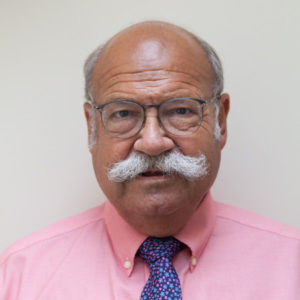
Podcast: Play in new window | Download
David Wilk interviews Bob Miller of Flatiron Books
October 8, 2018 by David
Filed under Publishing History, PublishingTalks
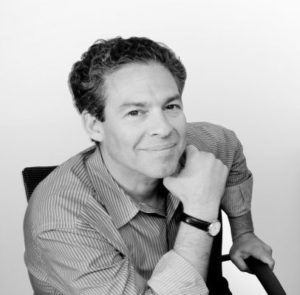 Publishing Talks began as a series of conversations with book industry professionals and people active in media and technology. At that time, some years ago, we were mostly talking about the future of publishing, books and culture, exploring what people were then thinking about the changing economics and culture of publishing and reading.
Publishing Talks began as a series of conversations with book industry professionals and people active in media and technology. At that time, some years ago, we were mostly talking about the future of publishing, books and culture, exploring what people were then thinking about the changing economics and culture of publishing and reading.
This series has expanded to go beyond the future of publishing, now engaging with the history of contemporary publishing and various other book-related subjects. I’ve talked with editors and publishers who have been innovators and leaders in a range of publishing projects, and will continue to explore the ebb and flow of writing and publishing in many forms and formats, to help document the specific cultural milieu around books, authors and publishers.
Bob Miller is currently the president and publisher of Flatiron Books, a relatively new division of Macmillan. Bob founded Hyperion for Disney in 1990 and was its president and publisher until 2008. He began his career at St. Martin’s Press and has also worked at Delacorte Press, HarperCollins, and Workman. Key titles Miller has acquired for Flatiron to date include What I Know For Sure by Oprah Winfrey, The Secret History of Twin Peaks by Mark Frost, Promise Me, Dad by Vice President Joe Biden, and in April, 2018, A Higher Loyalty by James Comey.
I thought it would be valuable to hear from Bob about his extremely successful publishing work with Flatiron and his colleagues there, and to get an understanding of what it takes to be successful in today’s commercial publishing. Bob has mastered all of the tools and strategies available to publishers, and understands better than most what it takes to continue to innovate and do well in a challenging environment. And the essential philosophy underlying the foundation of Flatiron has proved to be exceptionally strong. I hope you enjoy this conversation with Bob Miller as much as I did.
You can learn more about Flatiron Books and its current books here.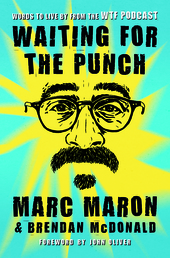
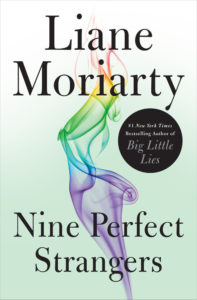
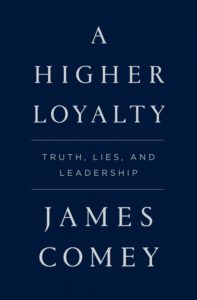
Podcast: Play in new window | Download
Gregory McNamee: Tortillas, Tiswin & T-Bones: A Food History of the Southwest
September 23, 2018 by David
Filed under Non-Fiction, WritersCast
 Tortillas, Tiswin & T-Bones: A Food History of the Southwest – Gregory McNamee – University of New Mexico Press – 256 pages – paperback – 9780826359049 – $24.95 – October 30, 2017 – ebook versions available.
Tortillas, Tiswin & T-Bones: A Food History of the Southwest – Gregory McNamee – University of New Mexico Press – 256 pages – paperback – 9780826359049 – $24.95 – October 30, 2017 – ebook versions available.
According to the publisher, this book is an “entertaining history [of] the many ethnic and cultural traditions that have contributed to the food of the Southwest.” And while I do agree that the book’s style makes it a relatively compelling and easy book to read, I think its author, Greg McNamee, is trying to do much more than entertain. McNamee uses food and cooking as a lens to understanding culture, yes, but also to pinpointing the issues that face us in America as we try to grapple with climate change, to live reasonably and sustainably on the earth, and to work together with our fellow humans. There is no heavy handedness to his approach, but he never lets us forget the driving themes of his work, and his perspective.
McNamee starts off by going back to the earliest periods when humans arrived in the Americas, and takes us through the beginning of agriculture in Mesoamerica, and the ancient trade networks that evolved to connect peoples of the coasts, plains, and mountains. From there, he takes us through the various areas that comprise the loosely labelled southwestern region of America, up through the present day’s fusion of cultures and foodways from so many different areas that defines this cuisine now.
Covering just about everything edible in human cultures in what we consider to be the southwest region (which he defines a bit more broadly than most), from chili pepper and agave, to modern day cuisines that include Frito pie and other cross cultural inventions, McNamee traces a culinary journey through varieties of space and time, to get us where we are today and significantly, what the southwest and its food and people might look like in our emerging future.
Tortillas, Tiswin & T-Bones is indeed, a masterful work of accessible anthropology that was recognized as one of the 2017 Southwest Books of the Year. Since I love the southwest and its food, reading this book was a great pleasure for me.
Greg McNamee is a writer, journalist, editor, photographer, and publisher. He is the author or editor of forty books and more than five thousand periodical contributions. He operates Sonora Wordworks, an editorial and publishing service, and is also the publisher of Polytropos Press.
McNamee is a research associate at the Southwest Center of the University of Arizona, and a lecturer in U of A’s Economics Department of the Eller College of Management. Additionally, he teaches courses and gives talks on writing, publishing, journalism, media and technology, as well as cultural and environmental issues. He lives in southern Arizona. Learn more about him and his work at his website.
It was a pleasure for me to get to speak with Greg, who is a great storyteller and conversationalist, and a I only wish we had been able to speak in person, and for a much longer period of time. And I was very pleased to learn how to pronounce “tiswin” too.
This book feels like sitting down to a dinner with Diana Kennedy and Jim Harrison, tequila in hand and great conversation going long into the night. It’s alive, a love story, a timeless journey. I absolutely loved reading it and will treasure Gregory McNamee’s words for a long time to come.
— Tracey Ryder, cofounder of Edible Communities and coauthor of Edible: A Celebration of Local Foods
Tortillas, Tiswin, and T-Bones sends the reader on a riveting adventure, tracking the origins of Southwestern ingredients and culture to reveal American history through food. McNamee’s prose is deft and authoritative, and this is a highly original, timely book.
—Kate Christensen, author of Blue Plate Special and How to Cook a Moose
Podcast: Play in new window | Download
Gordon Ball: East Hill Farm: Seasons with Allen Ginsberg
August 28, 2018 by David
Filed under Non-Fiction, WritersCast
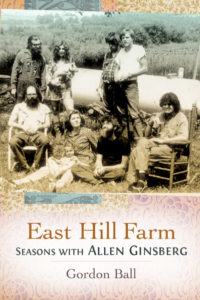 East Hill Farm: Seasons with Allen Ginsberg – Gordon Ball – Counterpoint Press – 416 pages – paperback – 9781619020177 – $18.95 – December 11, 2012 – ebook edition available at lower prices
East Hill Farm: Seasons with Allen Ginsberg – Gordon Ball – Counterpoint Press – 416 pages – paperback – 9781619020177 – $18.95 – December 11, 2012 – ebook edition available at lower prices
It’s been a great pleasure for me to be able to interview writer friends and editors about their work for the Writerscast and Publishing Talks podcasts. I first met writer, film-maker and now professor Gordon Ball soon after moving to Chapel Hill, North Carolina at the very end of 1973. I knew almost no one in North Carolina, but in those still counter-cultural days of boomer history, it was relatively easy to make friends, especially within the fairly small community of like-minded poets and writers that laid-back college town oasis attracted.
Gordon Ball was in Chapel Hill for graduate school, after spending several years as the amanuensis and farm manager for Allen Ginsberg at his funky farm refuge in Cherry Valley, New York. How Gordon got to be there, and what happened during his time among the heroes of the Beat Generation and the hippie revolutionists who followed them is the subject of his excellent and enjoyable memoir, East Hill Farm.
Allen Ginsberg was unique, as a poet who became a cultural icon, a political and spiritual leader whose writing has influenced millions of readers. East Hill Farm was his attempt to build a refuge from city life – “a haven for comrades in distress,” especially friends whose lives were being ruined by hard drugs like iconic beat poets Herbert Huncke and Ray Bremser, who both spent time at the farm in the late sixties. Gordon recounts his first hand stories of the refugees who arrived there as well as the many local upstate characters who helped make the dilapidated farm into a livable home and a functioning farm of sorts. This story is emblematic of so many “back to the land” excursions from the sixties, when hippies from the cities and suburbs arrived uninvited in small town farm communities in places like Vermont, Maine, northern California, Oregon and of course, upstate New York.
But he also tells us about his own journey, his family, the loves and losses that he experienced in this heady era when millions of young people all around the world revolted against the constraints of post-War modern capitalism, all trying to find a different way to live. His experiences and those of his compatriots help us understand how that special moment in our history was lived, and perhaps also, why it could not last or lead to the kind of social change its participants believed in and hoped for.
But what a great experience it was. And so much of what happened there will not be lost or forgotten because of this book.
“I couldn’t stop reading East Hill Farm and learning so much of what really went down on that farm in that so crucial period in the lives of the Beats. I visited the farm just twice but wish I had had Ball’s innocent yet so perceptive eye.” —Lawrence Ferlinghetti, author of A Coney Island of Mind.
“In the late 1960s, poet Allen Ginsberg bought an isolated, broken-down farm in upstate New York as a retreat for himself and his worn-out, burned-out friends. Ginsberg hoped to create an Elysium where they could escape from the urban pressures and drug addictions that had laid Kerouac, Corso, Orlovsky, and Huncke so low. Only a masterful story-teller like Gordon Ball could turn a depressing tale of poets at rock bottom into a triumph of the human spirit.”—Bill Morgan, author of I Celebrate Myself: The Somewhat Private Life of Allen Ginsberg
Gordon Ball photographed Allen Ginsberg and the Beat Generation for many years. As well as being exhibited at five conferences on Ginsberg and the Beat Generation, at one-man shows at the Southeastern Center for Contemporary Art and other venues, Ball’s photos have appeared in many publications. Gordon is the author of 66 Frames: A Memoir and a volume of prose poems, Dark Music. He lives in Lexington, Virginia, taught at VMI and now is teaching at Washington and Lee University. Author website here.
East Hill Farm is a charming, warm memoir that will be a compelling read for anyone who wants to know what it was like to live through the sixties with a cast of some amazing characters, many of whom helped create the culture we still experience today. It was great fun for me to reconnect with Gordon after so many years, and to share his experiences and memories through this wonderful book.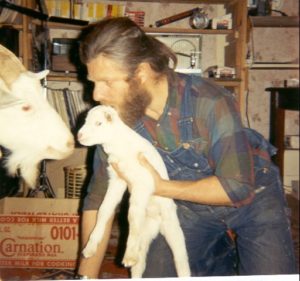
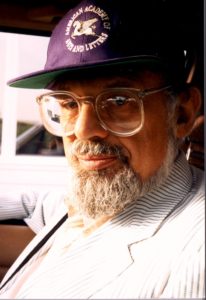
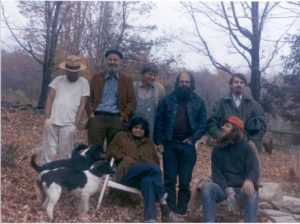
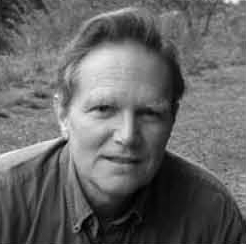
Podcast: Play in new window | Download
Joanna Cantor: Alternative Remedies for Loss (A Novel)
July 31, 2018 by David
Filed under Fiction, WritersCast
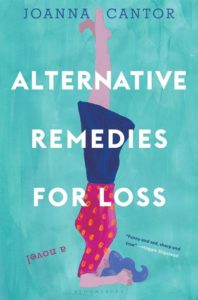 Alternative Remedies for Loss – Joanna Cantor – Bloomsbury – Hardcover – 9781635571714 – 320 pages – $26.00 – May 8, 2018 – ebook editions available at lower prices. Paperback comes out
Alternative Remedies for Loss – Joanna Cantor – Bloomsbury – Hardcover – 9781635571714 – 320 pages – $26.00 – May 8, 2018 – ebook editions available at lower prices. Paperback comes out
One of the great things for me about doing this podcast is that I have been introduced to such a varied range of books and writers. When I started this series, my intention was primarily to make myself a more regular reader. Like so many other people, I have found the intrusion of devices and media of all kinds distracting (in an enjoyable way for the most part), taking so much of my time away from the pure pleasure of reading, that I thought a regular schedule of talking to writers about their books would give me the discipline I generally lack, and make certain that I both read more books, and think more reflectively about what I read.
In many ways, of course, that intention has succeeded. But one of the surprises for me in this process has been that so many publishers and authors have approached me to read and interview an amazingly wide range of books. I have done my best to read books that are outside my “normal” range of interests. And that has been incredibly rewarding. Today’s interview, with the author of Alternative Remedies for Loss demonstrates one of those enjoyable discoveries that being a book podcaster has enabled.
Joanna’s story revolves around Olivia, who leaves her senior year at college to be with her mother through her terminal illness. The through line of the book is Olivia’s effort to cope with this unexpected loss. She takes a job in media in New York City in a sort of dazed state, and while it appears the rest of her family is moving on with their lives, Olivia cannot quite figure out what is going on now. Then she accidentally discovers that her mother might have been involved with a man other than Olivia’s father, and this emotional shock triggers Olivia’s quest to more fully understand her mother, come to terms with her own self in the world, and essentially to work through the emotions that are blocking her from being at peace.
There’s a great energy to this book, and because the writing is so good, the characters believable and fully formed, it is easy to get wrapped up in Olivia’s effort to become a fully formed human being in challenging emotional circumstances, perhaps her first in a fairly privileged upper middle class upbringing that many readers will recognize, and perhaps identify with themselves. Author Cantor refuses to whitewash her main character and gives her flaws and weaknesses that bring her to life. A good novel solves problems we sometimes did not realize we were able to engage with, and this one does that for me – I am glad to have had the chance to engage with Olivia’s story, and it was a pleasure to meet and speak with Joanna.
Joanna Cantor is a very talented writer. She lives in Brooklyn, teaches yoga and continues to write fiction. I really enjoyed reading this book and talking to her about writing, first novels, and of course, this book.
Joanna Cantor’s website is worth a visit.
(Production note: in doing this interview, I had a problem with the recording device, and we had to finish the conversation by phone, so you will notice some variations in the sound during the course of this particular podcast. I’ve got a new recording device now and hope to avoid problems like this in the future.)
Podcast: Play in new window | Download
Peter Donahue: Three Sides Water (Short Novels)
June 19, 2018 by David
Filed under Fiction, WritersCast
 Three Sides Water – short novels – Peter Donahue – Ooligan Press – paperback – 978-1-932010-98-5 – $17 – ebook versions available at lower prices – May 1, 2018
Three Sides Water – short novels – Peter Donahue – Ooligan Press – paperback – 978-1-932010-98-5 – $17 – ebook versions available at lower prices – May 1, 2018
Ooligan Press is an unusual publishing operation; it’s a Portland, Oregon based independent publisher that draws its books from the rich literary communities of the Pacific Northwest. Founded in 2001, Ooligan is also a teaching press dedicated to the art and craft of publishing. Affiliated with Portland State University, the press is staffed by students pursuing master’s degrees in an apprenticeship program under the guidance of a core faculty of publishing professionals. This gives the press a continual sense of transformation and rebirth as the people involved with it change so frequently. I’ve made a number of literary discoveries through Ooligan’s diverse and very literate offerings.
I am really pleased that Ooligan decided to send me Peter Donahue’s unusual collection called Three Sides Water. The book is a collection of three short novels that I was immediately drawn to. And once I started reading the first novel, I was completely hooked. Donahue has been writing about the Olympic peninsula of Washington for some time. While he no longer lives there, clearly the area west and north of Seattle has captivated his imagination. Three Sides Water follows the construct of a peninsula itself – three stories surrounded by the space beyond. Each of the book’s short novels is about young characters, all in very different time periods, learning what it means to take responsibility for their own lives, and all of them must make decisions that will have long lasting consequences for themselves and others in their lives.
In his writing, Donahue literally inhabits the landscape of the far northwestern edge of our country with these stories. There’s a certain exoticism he brings us, with a careful eye and precise descriptive language that never gets in the way of the stories he is telling. His characters are all very different but share a common desire to become “something” – whether it is more, or better, or simply the desire to become an authentic self. The Pacific Northwest’s Olympic Peninsula is a itself a dramatic element, within which his compelling characters do what they must to establish the arcs of their lives, all in different ways and with different means, but all operating from the deepest part of their selves. The stories share common traits but are set in completely different time periods and tell very different tales, making this collection great fun to read.
Peter Donahue has published two full length novels, Clara and Merritt and Madison House (winner of the Langum Prize for American Historical Fiction), as well as a collection of short stories, The Cornelius Arms. He is the co-editor of two literary anthologies, Reading Seattle and Reading Portland, and of Seven Years on the Pacific Slope, a 1914 memoir set in Washington’s Methow Valley. Since 2005, he has written the Retrospective Review column on Northwest literature for Columbia: The Magazine of Northwest History, published by the Washington State Historical Society. Donahue teaches at Wenatchee Valley College in Omak, a small rural campus in North-Central Washington. More about Peter Donahue and his work can be found at his website here. And learn about the interesting Ooligan Press at its website here.
Peter Donahue is a fine story teller and an excellent interviewee as well. Thanks to him and to Ooligan for this excellent book.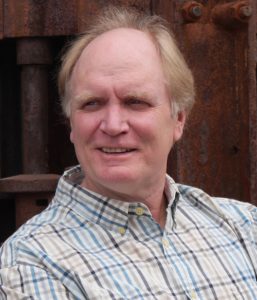
Podcast: Play in new window | Download

